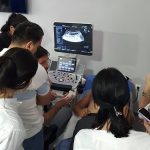Cultures and traditions related to gender roles and women’s empowerment are deeply rooted in many countries and have existed for centuries. With the objective to improve food and nutrition security of women and children, GIZ has commissioned m4h to conduct a multi-country gender study in selected countries in Africa and Asia (Togo, Ethiopia, India and Cambodia). The study probed into areas like economic empowerment, changes in decision-making in the household, nutrition and food production related topics and women’s membership of groups.
Program activities need to ensure that women will benefit and be empowered from their interventions. With the intention of finding approaches that reach, benefit and empower women, the main objectives of the study were:
- To analyze specific gender aspects and dimensions of women empowerment
- To analyze how men and other influencers can effectively be addressed and be involved in nutrition activities, and to identify ways of strengthening the role of women in nutrition related decision-making
- To identify possible non-intended effects of the global programs’ activities for women and their role in nutrition and propose options for adaptation
The Study used a mixed methods approach (quantitative and qualitative) to explore effects of Gender roles on Nutrition. The quantitative data from 600 interviews was triangulated with key informant interviews and case studies to strengthen the findings and inferences made for understanding social phenomena in more depth. Some highlights of the findings include:
- While men are seen as the head of the household and breadwinner, women are responsible for household work, preparing food and childcare
- Men mostly decide on agricultural food production but their decisions are also limited by seasonality, availability of seeds and market demand
- Community members and peers have opinions about men and women not following known gender roles and responsibilities
- Men are supportive to program activities but find it difficult to see it as “normal” that women would engage more in food production and they would engage more into food preparation
- Many respondents observed a slight increase of women’s decision-making on food production
- Women’s income increased by selling produce from the nutrition gardens
Based on the findings from this study it’s recommended that BMZ/GIZ ensure that all nutrition programs are gender-responsive and equally engage men and women. A stronger component of economic empowerment for women should be included into the Global Program and other nutrition interventions. In addition to that, innovative ways should be piloted to speed up changing stereotypes and cultural barriers.



